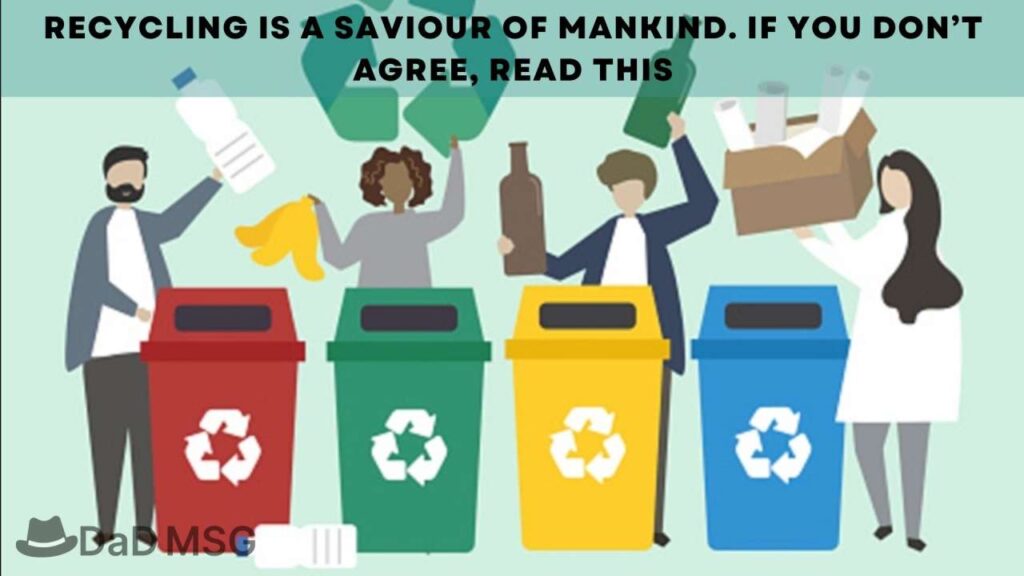Ever kept a record of how many products you consume that have plastic, chemicals and other recyclable components in them and after using them where they go and how they harm you and the environment? We all have heard the word recycle but there are very few people in billions who actually recycle. But have you ever thought about what will happen if those few people also stop recycling? The world is developing at the cost of environmental damage and the huge damage caused by this progress is not even considered in the GDP of any country. If there is no measurement tool for this damage then how are we gonna tell that recycling is important or the 3 R’s are important?
In Europe, around 50 per cent of the waste is recycled every year. And in the US 30 per cent of their total waste is recycled but still, it is not enough.
In our everyday activities, we buy and use things that contain recyclable components in them such as paper, plastic, metal, etc. And it is not possible that suddenly our inner human wakes up to remind us of our responsibility and we stop using such things and go environment friendly. Obviously, it will not be possible for the world to go plastic-free in 24 hours where half of the world depends upon packaged food. And this is just one thing there are many more. We can recycle to save ourselves and our environment. And for that, we need to know that Recycling is not an option but a necessity. And if this necessity is ignored then we aren’t aware of what this will cost us. So, let’s take a look at the damages that will be caused if we stop recycling.
- Landfill Overflow:- landfill is those places where garbage or waste materials are disposed of. These places are expected to last for 30 to 50 years, but if you stop recycling, the recyclable waste will increase and the demand for the places for disposal of waste material and garbage will increase. And wherever you will see you will find a landfill. The other damages that can be faced by increased landfills are infrastructure disruption by heavy vehicles used for disposal of waste on the roads, contamination of groundwater, and soil contamination.
- Increase in Pollution:- Plastics and most materials are non-biodegradable in nature. And when something is non-biodegradable in nature it will ultimately harm nature. The soil pollution will increase when they do not get recycled and will stay on the earth for eternity. Their presence in soil and direct contact with the sun will lead to an increase in harmful gases that will pollute the air. And we also know that marine life is also endangered with the increased use of plastics. The toxic chemicals lead to water pollution. So you see, how they all are linked and how badly that can affect mother earth.
- Affecting Animals:- well animals are not human of course and they don’t have a sense of what is harmful to eat. Many animals eat the plastic bags that contain food and they end up dead due to that. Animal life is precious just like that of a human. So if the recycling stops then this death rate will increase too.
- Health Issues will Increase:- All kinds of Pollution will affect human life in the end. Well, we have to pay for our doings, not now, maybe later, but for sure. Nature has its own way to take back the things that humans don’t value. We all consume water, we all eat food that grows on the earth, we all breathe and if these things will get polluted then how can you think you can live safely?
- Economic impact:- Well, the above reasons were mainly related to the environment but stopping recycling will also gonna affect us economically, How? Let’s see. Recycle companies will close down and people working there will become unemployed. Not only this, recycled products are comparatively less costly than new or fresh products. So, the cost of the end product will increase and that will lead to inflation in the economy. If recycling stops then we will suffer economically too.
- Increase in Greenhouse Gases:- greenhouse gases will increase and will then cause a threat to life. Harmful gases like methane and carbon dioxide will increase due to industries, and electricity consumption. An increase in greenhouse gases will increase the temperature of the planet, causing global warming.
- Reduction in Fossil Fuels:- fossil fuels are used by manufacturers to make plastics and nylon. Fossil fuels do not get ready in 2-3 years’ time, they need more than a decade to form and if we continue making new materials instead of recycling the old ones then there will be no fossil fuels left on the earth.
So these reasons are good enough to tell why we do not stop recycling and also adopt reuse and reduce in our life.




